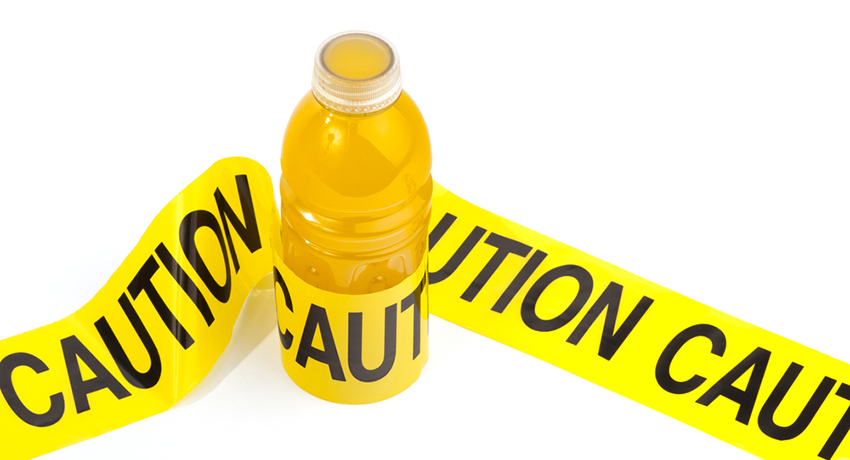Boston’s Supermarkets Team Up To Promote Healthy Beverages

sugar drink warning image via shutterstock
Updated 4:50 p.m.: We received a statement from a representative for the soft drink bottlers and distributors in Massachusetts. The entire statement reads as follows:
“Beverage companies are leading the way to help consumers make choices that are right for them, including offering many low and no calorie options that range in size, prominently displaying calorie information on the front of labels and cutting beverage calories in schools nationwide by 90 percent,” said Nicole Giambusso, a spokesperson for soft drink bottlers and distributors in Massachusetts. “Campaigns like this one being put forward by the Boston Public Health Commission are more sound bites than substance. If we want to address the complex issue of obesity, it should start with real education and exercise – not misleading campaigns that single out soda.”
I have to disagree. The campaign doesn’t single out soda. It looks at sports drinks, iced teas, juices, and energy drinks. And how is educating people on the calories and sugar in many sodas misleading? Furthermore, I don’t think this campaign is a war on soda. The campaign is a small step in an effort to help curb obesity. The statement says to “start with real education and exercise.” Real education? Well, should we start with the amount of sugar and chemicals in many sodas? Even diet sodas? I’m not against soda, but I do believe that the trend in the U.S. is leaning towards using more natural and organic ingredients. Perhaps the soda industry should focus their efforts on creating a better product, rather than fight a campaign hoping to improve public health.
Earlier:
Mayor Tom Menino has announced a partnership with Shaw’s, Star Market, Stop & Shop, and Dudley Square’s Tropical Foods to help educate shoppers about the healthy beverage options available in supermarkets across Boston. The campaign is called “Rethink Your Drink” and it’s unique because local supermarkets are teaming up with the City of Boston to promote healthy beverages and inform the public about the negative health impacts of consuming too many sugar-sweetened beverages. The grocers will display “Rethink Your Drink” signage in stores and in the weekly circulars for at least the next six months.
“In Boston, we’re always striving to make the healthy choice the easy choice,” Mayor Menino said. “We were an example for other major cities when it came to eliminating food deserts and increasing access to fresh, healthy options. I want to thank Shaw’s, Stop & Shop, and Tropical Foods for stepping up and being great examples for how we can continue to work together to create healthier communities.”
Rethink Your Drink is based on a color-coding system that aims to make it easier for consumers to understand how healthy or unhealthy different beverages are. Posters feature a traffic light symbol to categorize drinks as red, yellow, or green. “Green” beverages, such as water, seltzer, and low-fat milks are the healthiest options, while “yellow” beverages like diet sodas, iced teas, 100 percent juices, and low-calorie sports drinks should be consumed only occasionally. Health officials suggest that “red” beverages, such as non-diet sodas, energy drinks, and juices with added sugar, should be consumed rarely, if at all.
New evidence shows that color-coded systems such as Rethink Your Drink can be more effective than standard nutritional labeling or calorie counts in helping customers understand their purchases. Massachusetts General Hospital, for example, began color-coding food items in their cafeteria to reflect their nutritional value in 2010. A recent study by researchers there indicated that the system led to increased sales of “green” items and decreased sales of “red” items.
Mayor Menino originally launched the Rethink Your Drink campaign in 2011. Since then, schools, community centers, libraries, and many hospitals around the city have used the posters and brochures to educate the public. Earlier this year, the Boston Public Health Commission (BPHC) and Health Care Without Harm were honored with a Model Practice Award from the National Association of County and City Health Officials for a collaboration with 10 Boston hospitals to reduce sugar sweetened beverage consumption.
The BPHC and Harvard School of Public Health’s Prevention Research Center will monitor and evaluate the campaign to see whether or not the effort changes consumer behavior and results in healthier shopping habits. A total of 15 supermarkets are participating, and they account for a large majority of Boston’s full-sized grocery stores. This means, according to city officials, that tens of thousands of shoppers will see the messaging.
The “Rethink Your Drink” advertisements start Friday in weekly circulars in Boston. The signage in beverage aisles and displays to highlight healthy options also start Friday. There will be billboards on the roads and advertisements in community newspapers coming in the next few months.
“At Shaw’s and Star Market, we want consumers to have as much information as possible so they can make the shopping decisions that are best for them,” said Shane Sampson, president, Shaw’s & Star Market in a press release. “Parents are making a lot of decisions when they’re doing their weekly shopping, and having a quick way to discern which drink choices are the best for their children can help to create a more healthy population in the long run.”
The collaboration with supermarkets is one part of a larger work plan for the $4.6 million REACH (Racial and Ethnic Approaches to Community Health) grant that the Centers for Disease Control and Prevention awarded the City of Boston last year. The goal of the project is to develop strategies that reduce rates of obesity and hypertension among Black and Latino residents in Boston.

